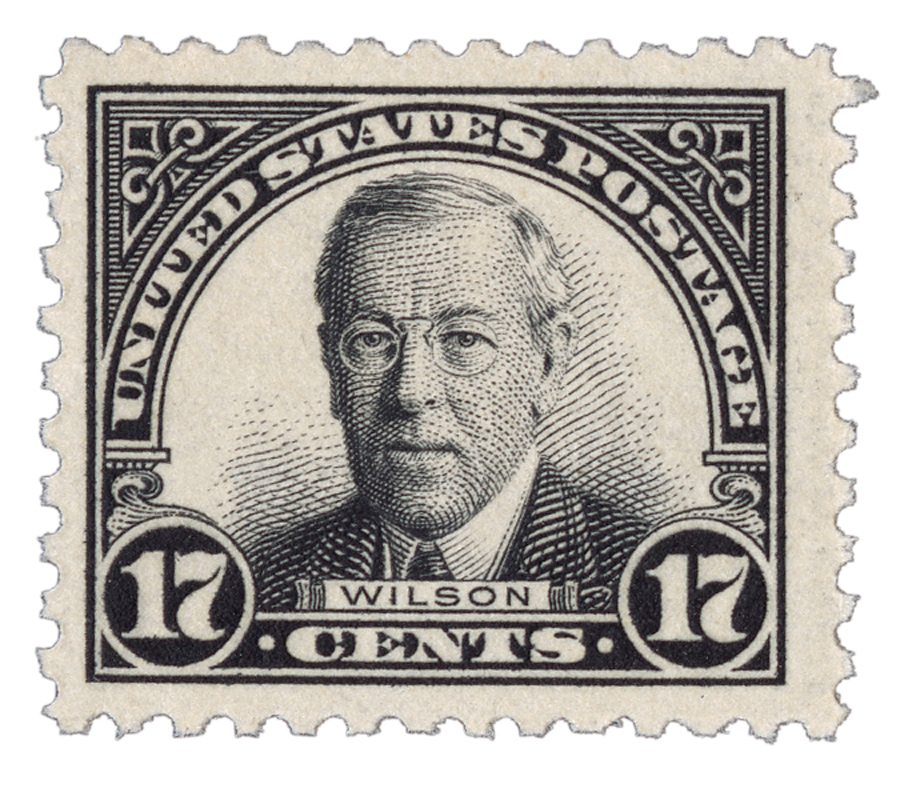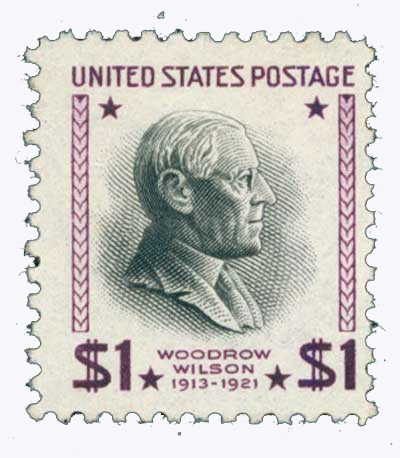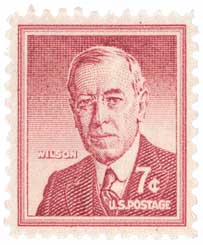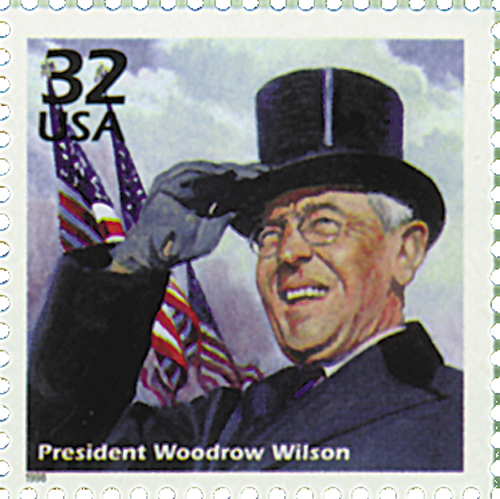
# 623 PB - 1925 17c Wilson, black, perf 11
1925-26 Regular Issue
17¢ Wilson
Issue Date: December 18, 1925
First City: New York, NY; Princeton, NJ; and Staunton, VA
Issue Quantity: 122,059,800
Birth Of Woodrow Wilson

Thomas Woodrow Wilson was born on December 28, 1856, in Staunton, Virginia, the third of four children.
Wilson’s family fiercely defended the Confederate cause, but also set up a Sunday school for their slaves. Reportedly, one of Wilson’s earliest memories was hearing Robert E. Lee say that Abraham Lincoln had been elected and that war was coming.
Wilson attended Davidson College in North Carolina and then Princeton here took great interest in studying political philosophy and history. As a student at Princeton, Wilson served as speaker of the Whig Party, wrote for the Nassau Literary Review, organized the Liberal Debating Society, and coached another debating group.

In 1882, Wilson passed the Georgia bar and opened his own law practice with a former classmate. He soon found the law practice was too competitive in the city and felt it was holding him back from his real aspirations to join politics. So in 1883, he entered Johns Hopkins University to study political science.
By 1886, Wilson had earned his PhD and briefly worked as a visiting lecturer at Cornell University. He went on to teach at Bryn Mawr College and Wesleyan University, where he coached football and started a debate team. In 1890, Wilson began teaching at Princeton. At that time, he also became the first lecturer of Constitutional Law at New York Law School. His stirring speech at Princeton’s 1896 sesquicentennial celebration was titled “Princeton in the Nation’s Service,” which became the university’s motto (and was later changed to “Princeton in the Nation’s Service and in the Service of All Nations”). In 1902, Wilson was promoted from professor to president of Princeton University. He took great joy in this role and made major reforms to the school.
With the support of the state’s Democratic Party, Wilson was elected Governor of New Jersey in 1910, winning by more than 49,000 votes. Within six months of taking office, he established state primaries, essentially removing party bosses from the presidential election process in the state. He also reformed the public utility commission and created workers’ compensation in the state.

Quickly gaining national fame for his work as governor, Wilson sought the presidency in the election of 1912. He received his party’s nomination and campaigned promoting “New Freedom,” which promised to limit the federal government and fight monopolies. Wilson won the election with 41.8% of the popular vote and 435 electoral votes.
Wilson wasted no time instituting his “New Freedom” promises, addressing antitrusts, tariff reforms, and changes to banking and currency issues. President Wilson held the first modern press conference on March 15, 1913, and that year gave the first State of the Union address in person since 1801.
One of the first major issues Wilson tackled was the Federal Reserve. The resulting Federal Reserve Act of 1913 gave private banks control of the 12 regional Federal Reserve Banks but placed controlling interest in a central board selected by the President, with Senate approval. The plan was passed that December and went into effect in 1915.
Tariff reform came with the Underwood Tariff in 1913. Wilson raised public support for the tariff by denouncing corporate lobbyists, addressing Congress in person, and putting on a large ceremony when he signed the bill. The reduced revenue that resulted from the lower tariff was made up through a new federal income tax created by the 16th Amendment.

Wilson also managed to end the long-time battle over trusts. Wilson encouraged competition through the Federal Trade Commission, which mostly put an end to unfair trade practices. He also pushed for the passage of the Clayton Antitrust Act of 1914. That act made certain business practices illegal, including price discrimination and agreements that allowed retailers to handle products of other companies.
When war broke out in Europe in 1914, President Wilson declared neutrality and aimed to keep America out of the conflict. He offered his services as a mediator, but the Allies and Central Powers never responded. On the home front, he faced criticism from Republicans, who thought he should begin building up the US Army. But Wilson believed that such actions would only provoke war.
During the election of 1916, Wilson ran with the campaign slogan, “He kept us out of war.” But after winning his party’s nomination, he warned that German submarine warfare taking American lives would not be tolerated. In November, Wilson narrowly won reelection.
1925-26 Regular Issue
17¢ Wilson
Issue Date: December 18, 1925
First City: New York, NY; Princeton, NJ; and Staunton, VA
Issue Quantity: 122,059,800
Birth Of Woodrow Wilson

Thomas Woodrow Wilson was born on December 28, 1856, in Staunton, Virginia, the third of four children.
Wilson’s family fiercely defended the Confederate cause, but also set up a Sunday school for their slaves. Reportedly, one of Wilson’s earliest memories was hearing Robert E. Lee say that Abraham Lincoln had been elected and that war was coming.
Wilson attended Davidson College in North Carolina and then Princeton here took great interest in studying political philosophy and history. As a student at Princeton, Wilson served as speaker of the Whig Party, wrote for the Nassau Literary Review, organized the Liberal Debating Society, and coached another debating group.

In 1882, Wilson passed the Georgia bar and opened his own law practice with a former classmate. He soon found the law practice was too competitive in the city and felt it was holding him back from his real aspirations to join politics. So in 1883, he entered Johns Hopkins University to study political science.
By 1886, Wilson had earned his PhD and briefly worked as a visiting lecturer at Cornell University. He went on to teach at Bryn Mawr College and Wesleyan University, where he coached football and started a debate team. In 1890, Wilson began teaching at Princeton. At that time, he also became the first lecturer of Constitutional Law at New York Law School. His stirring speech at Princeton’s 1896 sesquicentennial celebration was titled “Princeton in the Nation’s Service,” which became the university’s motto (and was later changed to “Princeton in the Nation’s Service and in the Service of All Nations”). In 1902, Wilson was promoted from professor to president of Princeton University. He took great joy in this role and made major reforms to the school.
With the support of the state’s Democratic Party, Wilson was elected Governor of New Jersey in 1910, winning by more than 49,000 votes. Within six months of taking office, he established state primaries, essentially removing party bosses from the presidential election process in the state. He also reformed the public utility commission and created workers’ compensation in the state.

Quickly gaining national fame for his work as governor, Wilson sought the presidency in the election of 1912. He received his party’s nomination and campaigned promoting “New Freedom,” which promised to limit the federal government and fight monopolies. Wilson won the election with 41.8% of the popular vote and 435 electoral votes.
Wilson wasted no time instituting his “New Freedom” promises, addressing antitrusts, tariff reforms, and changes to banking and currency issues. President Wilson held the first modern press conference on March 15, 1913, and that year gave the first State of the Union address in person since 1801.
One of the first major issues Wilson tackled was the Federal Reserve. The resulting Federal Reserve Act of 1913 gave private banks control of the 12 regional Federal Reserve Banks but placed controlling interest in a central board selected by the President, with Senate approval. The plan was passed that December and went into effect in 1915.
Tariff reform came with the Underwood Tariff in 1913. Wilson raised public support for the tariff by denouncing corporate lobbyists, addressing Congress in person, and putting on a large ceremony when he signed the bill. The reduced revenue that resulted from the lower tariff was made up through a new federal income tax created by the 16th Amendment.

Wilson also managed to end the long-time battle over trusts. Wilson encouraged competition through the Federal Trade Commission, which mostly put an end to unfair trade practices. He also pushed for the passage of the Clayton Antitrust Act of 1914. That act made certain business practices illegal, including price discrimination and agreements that allowed retailers to handle products of other companies.
When war broke out in Europe in 1914, President Wilson declared neutrality and aimed to keep America out of the conflict. He offered his services as a mediator, but the Allies and Central Powers never responded. On the home front, he faced criticism from Republicans, who thought he should begin building up the US Army. But Wilson believed that such actions would only provoke war.
During the election of 1916, Wilson ran with the campaign slogan, “He kept us out of war.” But after winning his party’s nomination, he warned that German submarine warfare taking American lives would not be tolerated. In November, Wilson narrowly won reelection.












